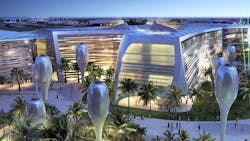UAE Channels Oil Money into Alternative Energy
ABU DHABI, United Arab Emirates --Rising from the desert outside Abu Dhabi, Masdar city is laying the groundwork for when the United Arab Emirates' oil wells run dry.
Driverless electric cars shuttle between energy-saving buildings topped with arrays of solar panels.
Traditional Arabic architecture mixes with modern technology, as narrow shaded alleys run between brick-colored buildings, focusing the wind and keeping temperatures low.
On the edge of the complex, a 10-megawatt solar farm lined with photovoltaic panels provides clean energy.
First announced in 2007, Masdar city in the suburbs of Abu Dhabi has not yet become the city of 40,000 authorities promised, with only a few hundred people, mainly students, in residence.
But the complex -- which hosts the International Renewable Energy Association Agency (IRENA) and the Masdar Institute for Science and Technology -- is at the forefront of the UAE's efforts to focus on renewables.
The company that bears its name has invested huge sums on green energy -- an unusual move for a country better known as an oil and gas producer and exporter.
Sitting on 5.9% of the world's oil reserves and 3.1% of its natural gas, the UAE, a federation of seven sheikhdoms, is a key player in the global energy market.
The discovery of commercial quantities of oil in the UAE in the late 1950s transformed the area, turning a few pearl-diving towns wedged between the Gulf and the desert into an economic powerhouse.
But its rulers know the oil won't last forever, with Abu Dhabi's Crown Prince Sheikh Mohammed bin Zayed al-Nahyan warning earlier this year that the country's last tanker load will be exported in 50 years.
"We understood that for us to maintain our leadership in the (energy) sector, we have to get into renewable, and we have done that," Masdar chief executive officer Ahmad Belhoul said.
Leveraging its Resources
Nawal al-Hosany, head of sustainability at Masdar, said the UAE had an "ambitious" plan for "leveraging its resources from the hydrocarbon industry into this new sector."
The UAE says it is expecting to invest $35 billion in non-hydrocarbon energy by 2020, including $20 billion on the Barakah 5.4-gigawatt nuclear power project.
Masdar has joined a number of clean energy projects abroad, Hosany said, investing some of the massive reserves the UAE has built up over the years.
Wissam Keyrouz, AFP
Copyright Agence France-Presse, 2015
About the Author
Agence France-Presse
Copyright Agence France-Presse, 2002-2025. AFP text, photos, graphics and logos shall not be reproduced, published, broadcast, rewritten for broadcast or publication or redistributed directly or indirectly in any medium. AFP shall not be held liable for any delays, inaccuracies, errors or omissions in any AFP content, or for any actions taken in consequence.
